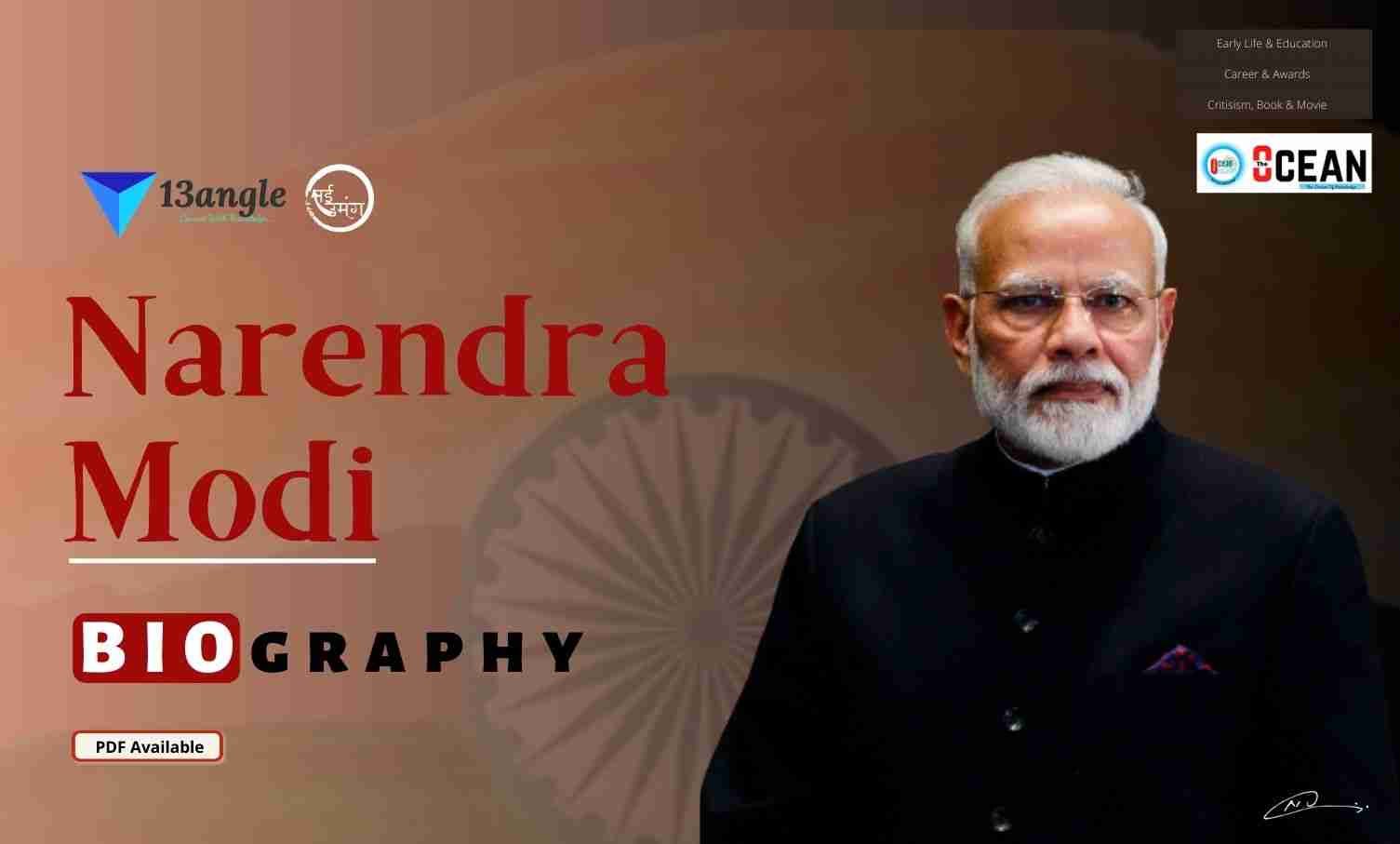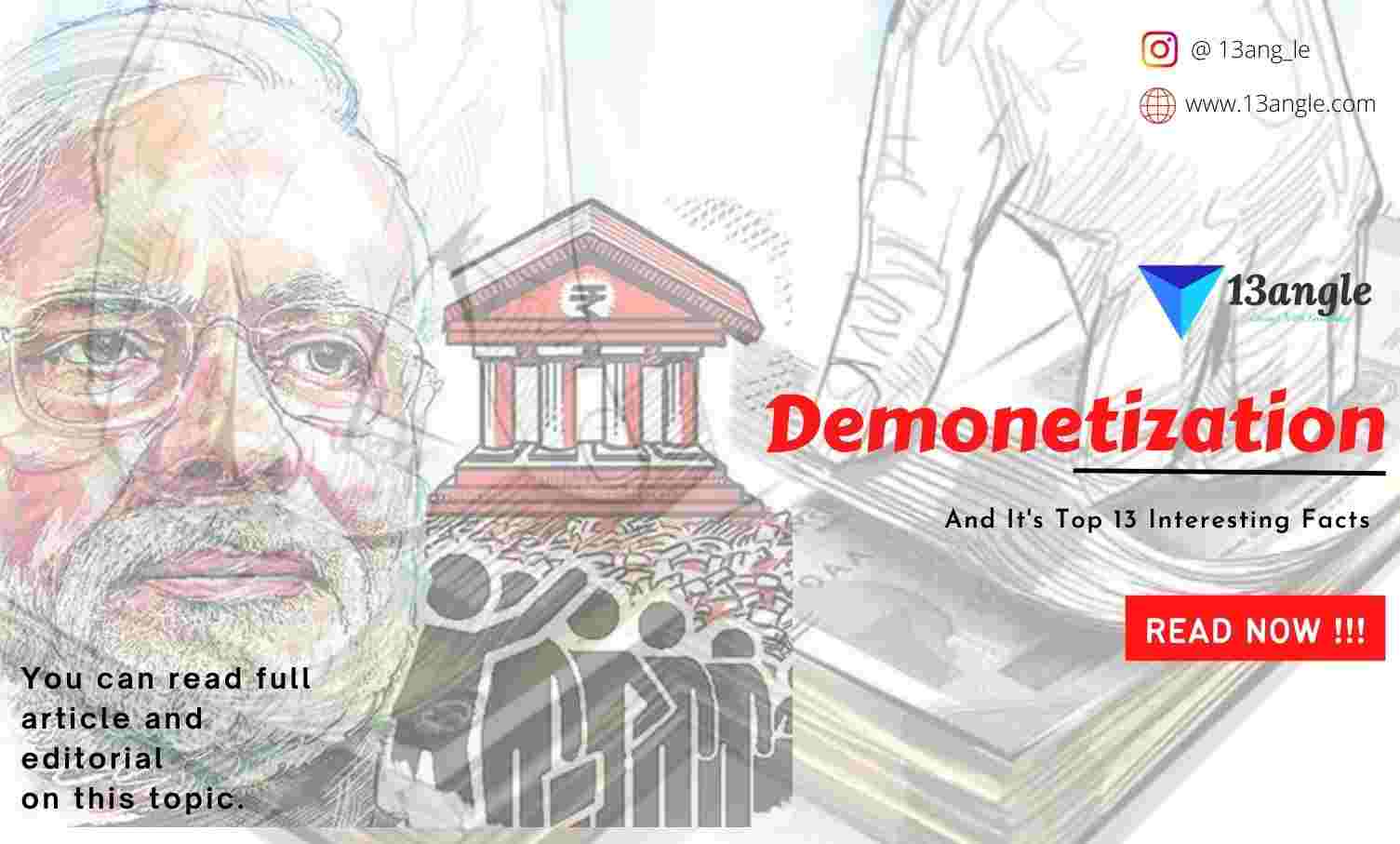
Early Life
- Vinayak Damodar Savarkar was born on 28 May 1883 in a Marathi Brahmin Hindu family in the village of Bhaghur the city of Nasik Maharashtra. Savarkar had two brothers named Ganesh and Narayan, he also had a sister Mainabai.
Savarkar’s childhood had been so difficult and full of problems because when he was about only 9 years old his mother died and after seven years even his father also died. Then his elder brother Ganesh took all the responsibilities at home. That’s why Ganesh played such a supportive role in his life.
His mother played a good role in his life being an activist against Britishers and a patriot. She used to listen to his inspirational stories of victories, Mahabharata, Ramayana and Shivaji, Guru Govinda Singh’s legends, etc.
Savarkar and his big brother founded the Mitra Mela organization which was replaced by the Abhinav Bharat society in 1906. Their main purpose was to throw out Britishers from India and revive Hindu pride.
During preparation for BA, he started the indigenous campaign. When he completed his degree, a nationalist activist Shyamji Krishna Varma helped him to go to England to study law.
Savarkar was so intelligent and curious. He was inspired by the assertive nationalists, Lal Bal and Pal, who burned British things.
- He joined Gray’s Inn Law college. Then he founded a free Indian society to fight for complete independence through revolution.
- Savarkar’s wife died on 8 November 1962 and then he started a hunger strike on 1 February 1966 he renounced medicines, food, and water which he termed as aatm samarpan and he died on 26 February 1966.
Political Life
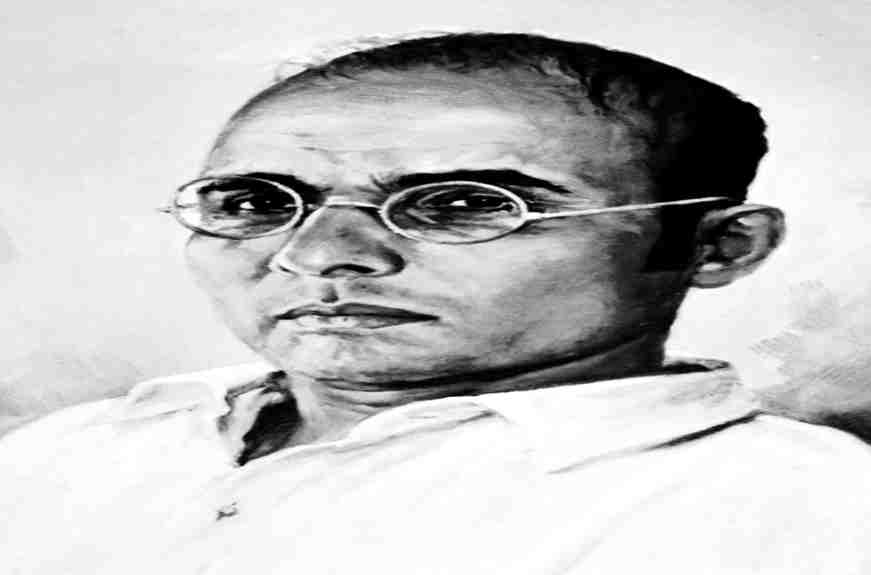
Savarkar was so attracted by political activities. He was a staunch patriot. He was inspired by Bal Gangadhar Tilak, Lala Lajpat Rai, and Bipin Chandra Pal. He established the Free India Society organization with Madam Bhikaiji Cama to encourage students to fight for the freedom of India through revolutionary activities.
Savarkar and Hindu Mahasabha openly opposed the call for the Quit India Movement and completely boycotted it. In 1939 Hindu Mahasabha joined hands with Muslim League and other parties under Savarkar’s presidency to make government in different cities.
As A revolutionary
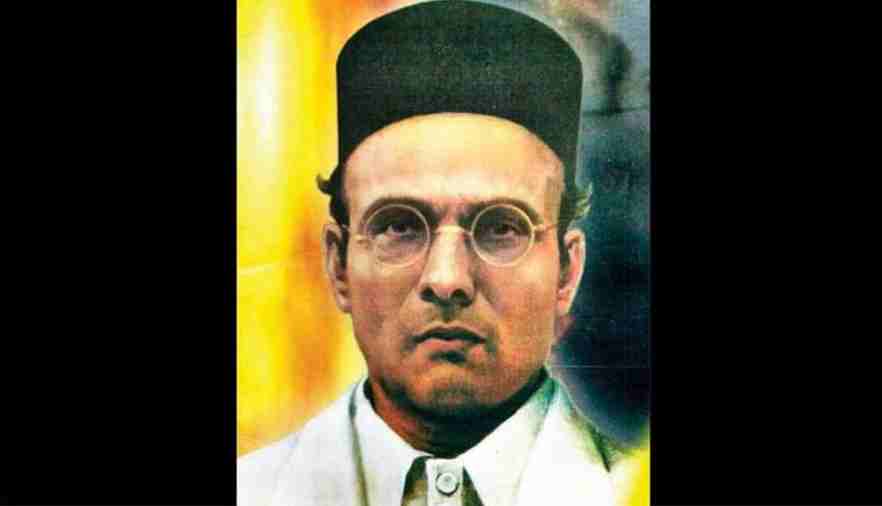
He was known as a Swatantra Veer and Veer Savarkar. We have been unknown from the truth. For patriots like Savarkar, darkness has filled up our minds. What could be worse for us than this?
One former Prime Minister of India Atal Bihari Vajpayee said about Savarkar that,
सावरकर माने तेज
सावरकर माने त्याग
सावरकर माने तप
सावरकर माने तत्व
सावरकर माने तर्क
सावरकर माने तारुण्
सावरकर माने तीर
सावरकर माने तलवार
सावरकार माने तिलमिलाहट…
सागरा प्राण तडमड़ला
तडमड़ाती हुई आत्मा
सावरकर माने तितीक्षा
सावरकर माने तीखापन
सावरकर माने तिखट ।
कैसा बहुरंगी व्यक्तित्व! कविता और क्रांति!
- Savarkar was also inspired by his brother Ganesh. Ganesh played a good role in teenage life. Savarkar used to believe in the full indigenous, he wanted Poorna Swaraj (पूर्ण स्वराज).
After joining college, he began influencing people through his speech and his writing to be against Britishers and let them out of India to make India a free country.
Savarkar was well known for his bravery. As a high school student, he started his political activities. He founded an organization with his big brother Ganesh. And when he went to study further in foreign, he joined other organizations like the Free India society. And he published books advocating the independence of India.
After 1937, Savarkar began to travel extensively. He advocated for social unity by becoming a potential speaker and writer. Savarkar didn’t acknowledge the agenda of congress leadership because it worked with the British by conversation.
Savarkar knew that until people are not awakened, there will be no freedom, so started to make people aware of this all. He wrote the first Indian War of Independence about the rebellion of India of 1857. But British officers banned that book before its publishing.
Once Savarkar said that,
माता भूमि पुत्रों
अहम पृथिव्या l
It means the land of India is my mother and I am her son.
- Even though his ideology of Hindutva is controversial, the sacrifice he made for the country is unbelievable.
Savarkar's Great Book- The Indian War Of Independence 1857
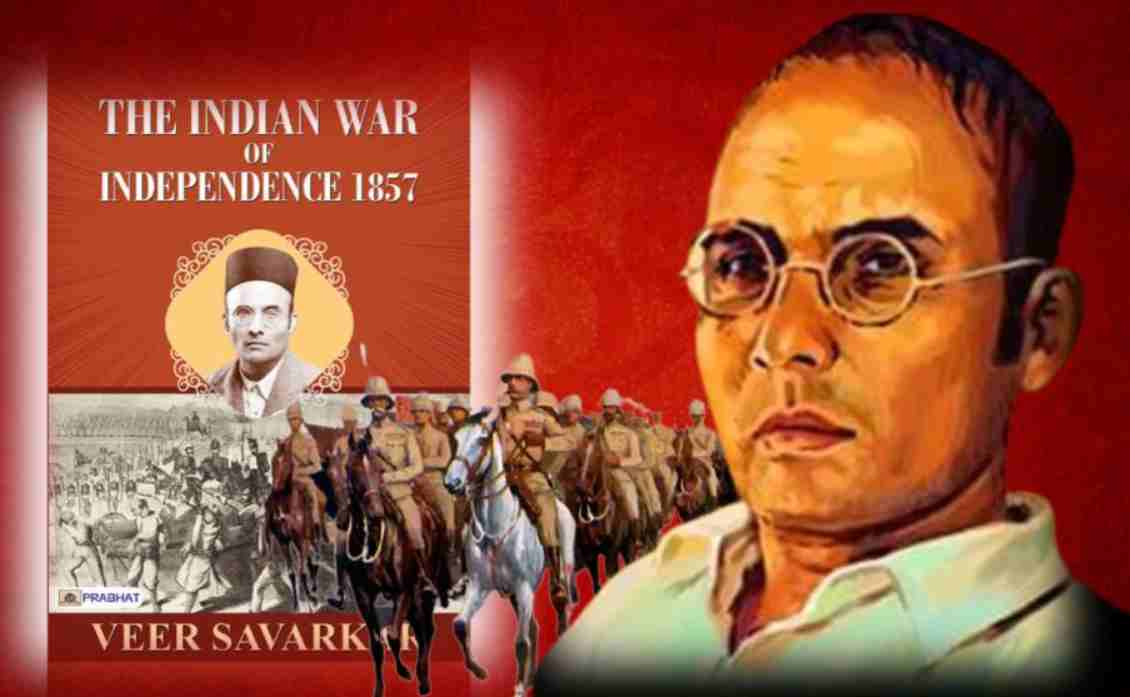
This book was written by Savarkar. For the first time, he described the first revolt of 1857 of Indian people against Britishers and considered Britishers unjust. But Britishers banned this book. Because they didn’t want to let people wake up.
He wrote a book named Revolt of 1857. And it was banned by Britishers before its publication.
When he sent a copy to Madam Bhikaiji Cama. Madam Bhikaiji Kama published this book in the Netherlands, Germany, and France. And after that Savarkar gained popularity among the revolutionaries.
Why Was He Punished By Britishers?
Britishers used to harass Indian people and tortured them. Savarkar was already on the lookout for Britishers When his friend Madanlal Dhingra killed Curzon Wyllie. And Britishers also caught Savarkar with Madanlal Dhingra. He was convicted and sentenced to 50 years of life imprisonment and sent to the cellular jail of Andaman Nicobar Island. And he was the first man who got life imprisonment two times. Out of which he spent 10 years in Kala Pani.
Those who were sentenced for Kala Pani were locked in the cellular jail by the British government. When sent to cellular jail is totally disconnected from the outer world, his family, and society.
Savarkar said that from early morning they worked very hard and that it was so difficult that even a strong person couldn’t work there. And if someone stopped, he was badly beaten. He had been very thirsty because of the hot room, but for a full day, they were provided only two bowls of water. The worst thing was even in the toilet sitting was not allowed. If there was a hell on the earth, that was the Andaman Nicobar Jail.
Savarkar endured all things for the independence of India. Yet he did not allow the idea of freedom to vanish, the patriotism was fully filled in his mind. He was fond of writing poems, and he wrote poems of revolution on the walls of the jail.
Exemption

- There is a large controversy about Savarkar’s pardon of Britishers. Many people think that Savarkar was so brave, he was an activist, yet he apologized to Britishers to free them from jail.
But the text of the petitions that we are taught was not a new thing it was completely normal. And filing the petitions was legal In which names and some other information were written. And not only Savarkar, but many people had also filed petitions before.
When George Pancham came to India, they provided this scheme to political prisoners. And even Mahatma Gandhi said that Savarkar had filed petitions, it’s not wrong at all.
But what was the opinion of Savarkar? He said that whenever the government gave them a chance to be freed from jail, he did that because his main goal was the independence of India. And one thing that when he wrote a letter to his small brother Narayan, he talked about this he didn’t hide it.
- Now it’s your turn, still, you are thinking that what he did was wrong?
No! Not at all. Because a soldier who fights for the country, who is convicted, and if he gets a chance to survive, to be alive so that chance is better than his sacrifices. He filed for positions because he didn’t want any opportunity to be missed to participate in the freedom struggle.
In 1921 he was released after 10 years with some restrictions. He was kept in detention for 16 years in Ratnagiri of Maharashtra.
On 22 June 1940, he met Subhash Chandra Bose and they discussed the movement for freedom. Savarkar told him to go to foreign and freedom organizations.
The crime of Savarkar was patriotism and he got blamed in return for killing Gandhiji. He was arrested from his house in Shivaji Park and kept under detention. And obviously, he was revealed because no one had any proof which proved Savarkar was a murderer.
- Atal Bihari Vajpayee the former Prime Minister of India was also inspired by Savarkar, once he said about Savarkar that,
जो बरसों तक सड़े जेल में, उनकी याद करें।
जो फाँसी पर चढ़े खेल में, उनकी याद करें।
याद करें काला पानी को,
अंग्रेजों की मनमानी को,
कोल्हू में जुट तेल पेरते,
सावरकर से बलिदानी को।
याद करें बहरे शासन को,
बम से थर्राते आसन को,
भगतसिंह, सुखदेव, राजगुरू
के आत्मोत्सर्ग पावन को।
अन्यायी से लड़े,
दया की मत फरियाद करें।
उनकी याद करें।
बलिदानों की बेला आई,
लोकतंत्र दे रहा दुहाई,
स्वाभिमान से वही जियेगा
जिससे कीमत गई चुकाई
मुक्ति माँगती शक्ति संगठित,
युक्ति सुसंगत, भक्ति अकम्पित,
कृति तेजस्वी, घृति हिमगिरि-सी
मुक्ति माँगती गति अप्रतिहत।
अंतिम विजय सुनिश्चित, पथ में
क्यों अवसाद करें?
उनकी याद करें।
Hindutva
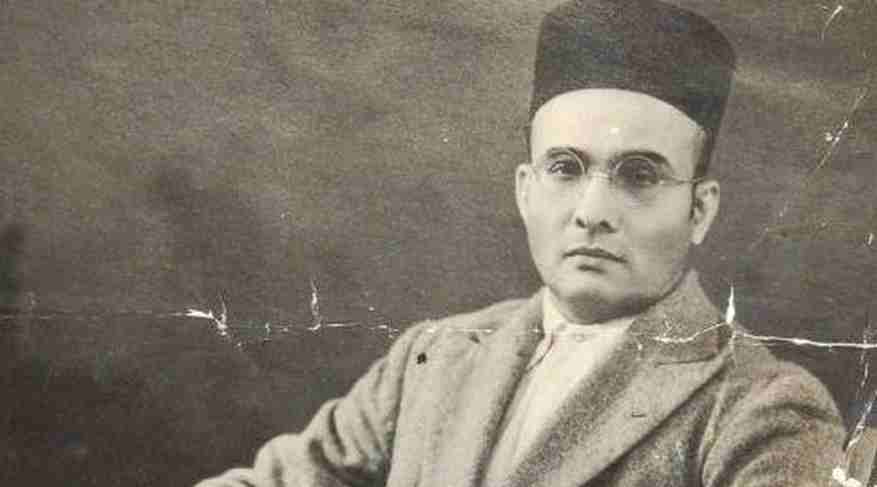
One more thing which is also controversial is Savarkar’s idea of Hindutva.
According to Savarkar Hindutva was not a religious segment but it was a cultural segment. Where all religions could live together.
Savarkar was one type of a rational atheist. He used to believe more in science instead of traditions. His thoughts were totally different from Gandhiji. Savarkar was irreligious.
According to Savarkar, Hindutva was not a religious topic, it was a political topic.
Those people who used to live in India in ancient times. Those were called Hindu somehow. That’s not our topic but Muslims and other Religions formed after that.
That’s why somewhere even today Muslims are called Hindu-Muslims and Christians are called Hindu-Christians, and these people had been living for thousands of years in India and following Indian culture.
And that’s what Savarkar had described in his book Hindutva.
Those people who believed in Bharatvarsha considered the land of India as their Motherland or Fatherland.
All those people are Hindu first before being a Muslim or Sikh or other.
In short, Savarkar said that those people are of the same religion and are living in India and following the culture of India.
- Savarkar said Hindutva is a big segment and Hinduism is a small part of it.
Books Written By Veer Savarkar
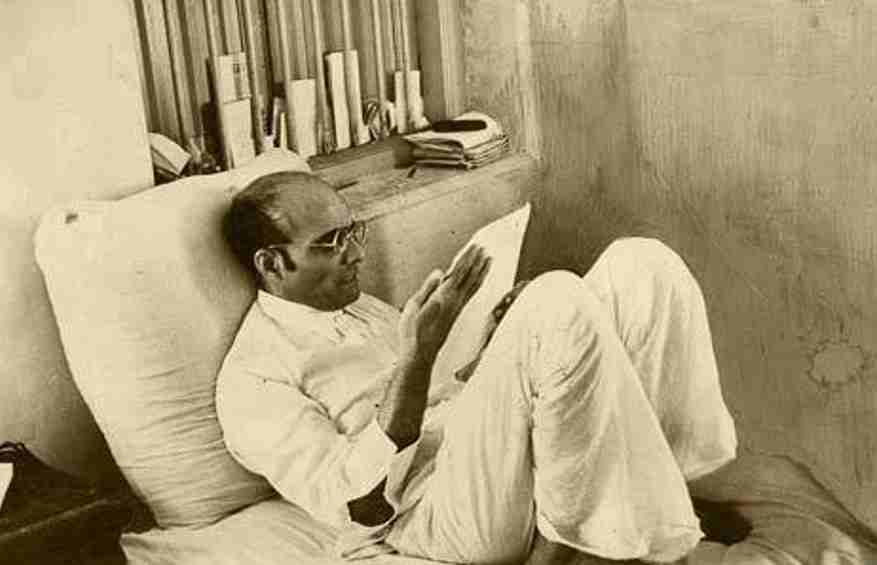
- The Indian War of Independence 1857
- Hindutva
- Hindu-Pad Padshahi
- Hindu RashtraDarshan
- Six Glorious Epochs of Indian History
- My Transportation for Life
Movie Based On Life Of Veer Savarkar
- Released on: 16 November 2001
- Name: Veer Savarkar
- Actor: Shailendra Gaur (as Savarkar), Surendra Rajan (as Gandhiji), Rohitash (as Ganesh Damodar), Pankaj (as Madan Lal Dhingra)
- Director: Ved Rahi
- Producer: Sudhir Fadke
- Music: Sudhir Fadke

Top 13 Interesting Facts About Vir Savarkar
Savarkar was so interested in revolutionary activities. He became a barrister. He joined organizations that used to work for revolutionary activities for fighting against Britishers. His main ideology was to fight for freedom which was completely against Gandhi’s nonviolent movement.
Savarkar wrote a book about the first war of India against Britishers, and it was like Shrimad Bhagavad Geeta for revolutionaries. Many people were inspired after reading that book to fight for freedom, fight for the country.
Savarkar had lit the bonfire of foreign clothes, and then Gandhiji adopted the same concept and started the swadeshi movement.
Bal Gangadhar Tilak considered him to be an incarnation of Chhatrapati Shivaji Maharaj.
As a teenager, Savarkar formed an organization named Mitra Mela to increase thoughts of revolution with his brother Ganesh Damodar Savarkar.
Savarkar was a good poet and writer. He was the president of Hindu Mahasabha for seven years. Savarkar never joined RSS despite being its philosophical founder.
In Ratnagiri, Savarkar worked as a social reformer. Like Ambedkar, he also participated in breaking the thought of castes. He said to remove the castes.
In 1905, Savarkar, inspired by Lokmanya Tilak, burnt foreign clothes and many other things.
Savarkar believed in atheism and considered superstition to pray to a cow. He said to take care of cows but not to pray for them.
Savarkar advocated the thought of two different nations Hindu and Muslim in his book Hindutva. And these thoughts were passed as a proposal by Hindu Mahasabha in 1937.
Savarkar was a rational atheist person, who used to believe more in science instead of domestic traditions.
Savarkar was arrested for planning a rebellion against the Morley Minto Reform. He tried to run away from the water, but he was caught. And convicted by Kala Pani in the cellular jail of Andaman and Nicobar. He was released from prison after ten years under strict conditions of not participating in political work for five years.
Savarkar had written a poem आ मृत्यु (AA MRITYU) before 15 minutes of his death.


